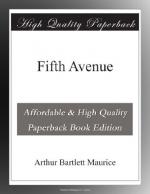In the winter of 1867-8 the club was enlivened by a bout of fisticuffs that was a “celebrated case” of its day. There was then a strict club rule forbidding the introduction of a guest. Manager Bateman, the father of Miss Bateman the actress, saw fit to violate this law. A member of the House Committee, perhaps overzealous in the idea of his duties, carried his protest to the point of forbidding the servants of the club to serve the unwelcome guest. Mr. Bateman’s resentment of the action took the form of a personal assault, which became the sensation of the hour and the topic of the newspapers. “Evidently,” remarked the “Herald” (those were the days of the elder Bennett, who in his vast experience in New York journalism had more than once felt the sting of a horse-whip), “to be slapped is what some faces are made for!” But the Governors did not see the matter in the light that the “Herald” did, and the pugilistically inclined manager was summarily expelled, the board refusing to settle the matter by accepting his resignation.
Another Fifth Avenue club that claimed 1865 as the year of its origin was the Traveller’s. For obvious reasons many of the clubs of the seventh decade of the last century chose to be near the old Delmonico restaurant, and the Traveller’s was no exception, making its first home on the opposite corner. The object of the association was to bring together travellers of all nations, and to do proper honour to distinguished who were visiting the United States. After two years at the Fourteenth Street corner the Traveller’s moved northward to a new home at No. 222 Fifth Avenue, the George W. Burnham residence at Eighteenth Street. Mr. Fairfield apparently did not regard the club with entire favour, for in his book of 1873 he speaks of the club-house as being “a leading resort for America-examining Englishmen, and the headquarters of an English coterie of considerable social importance.” “O tempora! O mores!” he exclaims. There were palmy days in the past, when the receptions were social reunions of eclat. But “they have made an end of all that, having settled into a body as quiet as Mr. Mantilini expected to be after taking a bath in the Thames.” But, granting Mr. Fairfield’s claim that the literary quality of the Traveller’s had deteriorated, there still remained the list of Honorary Members carrying a certain prestige. Professor Louis Agassiz headed the list; and others were Paul Du Chaillu, the African explorer whose adventures were for a long time regarded as clever romance; the Hon. Anson Burlingame, who had been an envoy from the Chinese Emperor; Sir Samuel Baker, of London; Rev. J.C. Fletcher, Professor Raphael Pumpelly, the Right Rev. Bishop Southgate, the Hon. J. Ross Browne, and M. Michel Chevalier, of the French Senate.




